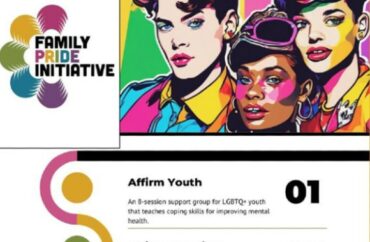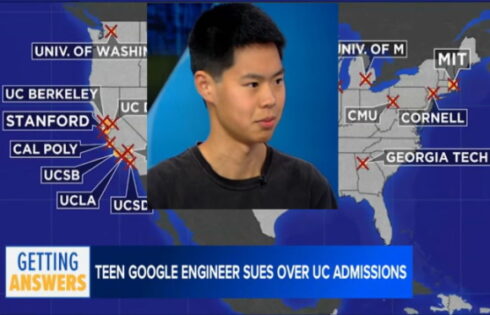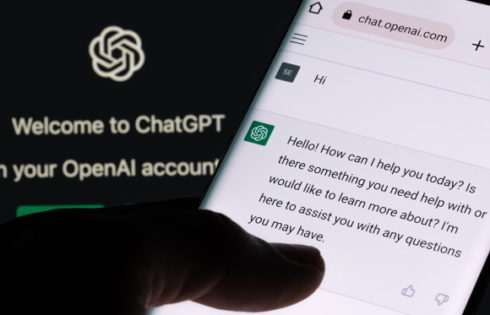
UPDATED
‘Pride’ program funded by $1.2 million federal grant
A University of Arizona “pride” program is facing backlash for allegedly working with a local school district to solicit minors for LGBTQ+ mental health screenings without a parent’s consent.
However, a university spokesperson said the program does require students to obtain parental consent to participate.
The allegations against the Family Pride Initiative’s AFFIRM program stem from a viral post on X by @ALegalProcess, which asserts the Catalina Foothills School District and the university “covertly” solicited minors for mental health screenings and treatments related to LGBTQ+ issues.
The Family Pride Initiative is a collaboration between the university and several health care groups. It aims to “reduce behavioral health disparities and improve outcomes for LGBTQ+ youth by strengthening supports for youth, caregivers, families, and the providers who serve them,” according to its website.
However, according to the X post, the local school district allegedly sent unsolicited emails to minor students via Google Classroom inviting them to participate in an AFFIRM Zoom meeting.
BREAKING – Catalina Foothills School District and University of Arizona caught covertly soliciting minors for mental health screenings and treatment for lesbian, gay, bi, trans, queer program without obtaining parental consent required by Arizona law.
*PARENT KICKED OUT WHEN… pic.twitter.com/jtDS4OelE6— TheLegalProcess (v2.0 | Post-Election Ed) (@ALegalProcess) June 9, 2024
The controversy escalated when parent Dan Grossenbach said he joined one of the Zoom sessions after seeing the email to his child, according to a YouTube video by Save CFSD, a group of parents who advocate for “virtue and academic excellence” in the school district.
Grossenbach said he was removed from the meeting by the program’s director, Shannon Fowler, who told him the session was designated as a “safe space” exclusively for minors.
Mitch Zak, a spokesperson for the University of Arizona, told The College Fix in a recent email that a child was signed up to attend the meeting, not the parent.
“The parent referenced in the social media posts signed his child up for the AFFIRM workshop series (indicating consent) and then proceeded to join the youth workshop himself,” Zak said.
Zak told The Fix that maintaining a safe space for youth includes protecting them from adults who should not be in the workshops. The problems are these adults are not trained to facilitate the workshops and have not undergone a background check in accordance with UA policy governing interactions with non-enrolled minors, he said.
He said the AFFIRM workshop series does require parental consent for minors, and it isn’t connected to any school district.
“When a parent or caregiver signs their child up for the AFFIRM Youth workshop series offered by Family Pride Initiative, they provide consent for their young person to participate. Minors who sign themselves up for AFFIRM Youth must obtain parent or guardian consent before participating in the workshop series,” Zak told The Fix.
But Grossenbach told The Fix in an email Thursday that he did register for one session as a parent, and he believes the university’s statement about requiring parental consent is not true.
“After I signed in as a parent with my true name, I also signed up for a separate Zoom session as a 13-17 year old student with a fictitious name,” he said, providing screenshots of his online actions to The Fix. “… The questionnaire asked if I’m in contact with a parent/guardian and I selected ‘No.’ it also asked if my parent/guardian knew I was LGBTQ. I also said ‘No.’ Yet they immediately scheduled me for a zoom anyway.”
He also expressed strong concerns about the program in an earlier email to The Fix.
“It’s inappropriate for behavioral health screening of minors without parental consent with rare exceptions such as in cases of abuse or abandonment,” he said.
Grossenbach told The Fix children lack the capacity to make informed decisions on their own, a principle reflected in laws about counseling and healthcare.
“Parents are a child’s best shot at surviving and flourishing,” he said. “Any process that circumvents or impedes that protection hurts the child for whom informed consent isn’t possible.”
MORE: South Carolina med school to stop prescribing transgender drugs
He also said keeping a child’s sexual identity hidden from “bad parents” is generally not justified, and such claims require sound moral arguments and objective standards.
“If someone claims non-conforming gender affirmation is morally good—or even acceptable—they need to show what objective standard establishes a relevant moral rule,” Grossenbach said.
He challenged the assertion that the program is focused on mental health. Grossenbach said there are inconsistencies between the program’s stated goal of using cognitive behavioral therapy to help young people and its approach to gender identity.
“Affirming a subjective identity in lieu of biological reality directly contradicts the goal of CBT,” he said.
He also said there was a lack of professional mental health credentials among the program’s presenters.
The AFFIRM program is funded by a $1.2 million federal grant to the university’s Southwest Institute for Research on Women Family Pride Initiative, a news release states. This initiative provides mental health services to LGBTQ+ youth and training programs.
Fowler, who directs the program, stated in the news release that the Family Pride Initiative “aims to address a common experience among LGBTQ+ youth and young adults … of feeling rejected by family members for their sexual or gender identity.” Some become separated from their families or homeless, according to the release.
“There wasn’t really anything to help families before they get to that point,” Fowler said. “We’re focusing on the preventative side of supporting families and youth in their situation now instead of having to experience all of those things.”
Fowler said the grant money will be used to reach up to “120 youth and 50 family caregivers each year for the next three years.”
Editor’s note: The article was updated to include comments from the university, stating students must obtain parental consent to participate in the AFFIRM workshop. The article also was updated to include additional comments from Grossenbach about how he signed up for the workshop.
MORE: NIH kicks out scholars critical of gender identity from ‘sex and gender’ event
IMAGE: Family Pride Initiative website
Like The College Fix on Facebook / Follow us on Twitter






Please join the conversation about our stories on Facebook, Twitter, Instagram, Reddit, MeWe, Rumble, Gab, Minds and Gettr.